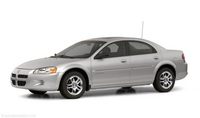New Car/Review
Dodge Stratus SE (2002)
SEE ALSO: Dodge Buyer's Guide
By Matt/Bob Hagin
SPECIFICATIONS
Manufacturer's Suggested Retail Price $ 18,410
Price As Tested $ 19,450
Engine Type DOHC 16-valve 2.4 Liter I4 w/SMFI*
Engine Size 148.2 cid/2429 cc
Horsepower 150 @ 5200 RPM
Torque (lb-ft) 167 @ 4000 RPM
Wheelbase/Width/Length 108.0"/70.6"/191.2"
Transmission Four-speed automatic
Curb Weight 3200 pounds
Fuel Capacity 16.3 gallons
Tires (F/R) 205/65R15 all-season
Brakes (F/R) Disc (ABS)/disc (ABS)
Drive Train Front-engine/front-wheel-drive
Vehicle Type Five-passenger/four-door
Domestic Content 85 percent
Coefficient of Drag (Cd.) N/A
PERFORMANCE
EPA Economy, miles per gallon
city/highway/average 21/26/30
0-60 MPH 11.7 seconds
1/4 (E.T.) 18.1 seconds @ 79.0 mph
Top-speed 112 mph
* Sequential multi-port fuel injection
(Dodge made a name for itself in the '60s with a "full-sized" compact that was built for reliability rather than speed says Bob Hagin. Matt Hagin says the '02 four-cylinder Stratus fits that category too.)
BOB - Back in the '60s, the Dodge Dart had a slant-six engine that had just enough power to keep up with traffic, carry five people and get good fuel economy while doing it. It was almost bullet-proof and it developed an enthusiastic following that exists to this day.
MATT - The new Dodge Stratus fits into these parameters, Dad, especially when it's fitted with the slick 2.4-liter four-banger engine. This powerplant is lots more up-to-date than the old slant-six, of course, but it's economical and reliable, too. It's all-aluminum with a fairly sophisticated twin overhead cam system that operates four valves per cylinder. Unfortunately it doesn't carry a high-tech variable valve timing system which would make it develop more power but it would add to the price of our SE version. It puts out a respectable 150-horsepower and 167 pound/feet of torque which indicates that it's tuned for pulling power rather than speed. It's not nearly as popular as the V6 that's also available in the Stratus but it's probably a better buy and lots better suited for buyers who buy with their heads rather than with their perceptions of what's "in." According to the EPS specs, it gets 21 miles per gallon around town and 30 on the highway but this last number is only available to feather-foot drivers who do a lot of downhill driving.
BOB - When your brother Bren and his wife tried out the Stratus SE last year, it had a V6 and an automatic transmission and it went along very well. Dodge has a five-speed manual transmission in its parts bin but it's reserved as standard equipment for the hot-rod V6 R/T model with a four-speed automatic as an option. If the buyers of an automatic-equipped R/T feels the need to revert to type on occasion, they can opt for an automatic/stick-shift system that lets them shift up and down without having to bother with a clutch but then go back to "Drive" if they want. The automatic is standard equipment in our SE but you can't get it with the automatic/stick-shift device. I'd guess that a stick-shift Stratus sedan is going to be a rarity since only a diehard performance enthusiast would go for one that has to do double-duty as a daily-driver by the rest of the family. Having to drive a stick-shift around the hills of San Francisco would be a chore if you were teaching the new driver in the family how to drive.
MATT - The chassis of all the versions of the new Stratus are the same but there are differences between the suspension settings. Our entry-level model has what Dodge labels "normal" duty while the next up ES has "sport-tuned" suspension with a sway bar up front. The R/T has "performance" suspension but the Dodge press kit doesn't explain what the differences are. Last year all the Stratus version were fitted with disc brakes all around including the bottom-feeder SE. They can all be had with an anti-skid brake system and although it adds a few bucks to the cost of the car, it's a handy option if the driver get in a position where it's really needed. At that point, it would be worth almost any price.
BOB - The handling of our Stratus SE is pretty much standard fare for a car that's designed for utilitarian family use and in corporate lease fleets or in rental fleets. The relatively narrow 15-inch all complain loudly when they're pushed into a fast sweeper and there's the expected pronounced front-end "push" on tight turns. The interior is comfortable enough but it's lacking fancy stuff like memory chips for seat positions and a top-level sound system. The basis SE doesn't have a sunroof even as an option but then that never was a favorite with me. It's about as basic as my original '64 slant-six Dart.
MATT - I vaguely remember that car, Dad, and as I recall, it went down hill after you turned it over to my brothers to drive.
BOB - That's true, Matt, but I have to hand it t6o that old car. It didn't go down without a fight.



